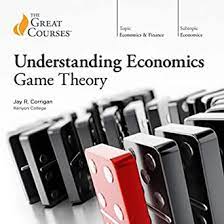Pick Your Weapon: Dueling was a way to establish creditworthiness in an era before credit scores. File Size 4.78 GB Format File [Webrip 13 MP4]
Jay R. Corrigan – Understanding Economics: Game Theory

Imagine yourself as a criminal being interrogated and interrogated by police. Your accomplice is being interrogated separately in the next room. While both of you would be better off keeping your mouths shut, the worst outcome is if you stay silent and your confederate confesses, implicating you and getting a lighter sentence as a reward—so that would actually mean a better outcome for you if you confess and they stay quiet. Game The theory is that you will both confess and receive a lesser punishment, but a higher level of punishment than you would have received if your statements were true.
These are strategic predicaments “prisoner’s dilemma” You can operate in almost every area of life, but economics is the most interesting. There, competition, profit, market power, and other factors all make the marketplace an infinitely fascinating arena for game theory.
Understanding Economics: Game Theory This book introduces you to this fascinating topic through the lense of economics in 12 entertaining halves-Hourly lessons by Professor of Economics Jay R. Corrigan Kenyon College Named one of America’s best college professors by The Princeton Review, Dr. Corrigan Uses minimal math and maximum ingenuity to illustrate scenarios such as:
Swine Strategy: A Nobel Prize for the fight for food between a large pig and a small pig.-A winning idea in game theory. John F. Nash created the Nash equilibrium. This explains why the little Pig should wait at the food trough and the Big Pig pushes the food.-You will find the dispensing lever across the pen. The big pig then has to trot to the trough and nudge the little pig out of the way, but it is both animals’ best strategy.
Ultimatum GameThe ultimatum game is an anonymous game in which two people interact in human psychology. One player proposes to split a sum. One player proposes to divide a sum of money. The other accepts or declines. In which case, no one gets anything. Since something is better that nothing, it makes sense for the second player to accept any division. People often overlook this reasoning in favor of fairness issues.
Going, Going, Gone!Auctions can be efficient for buyers and sellers. Prof. Corrigan The following article will examine the basic types of auctions, and the best strategies for each. One of the most dangerous pitfalls is the “winner’s curse,” common in auctions where the value of the asset being sold is the same for everyone, but is unknown—for example, the acquisition of mineral rights. The winner usually overpays and runs the risk of financial ruin.
Professor Corrigan notes that in his economics classes, he makes the winner’s curse viscerally clear by having his students bid on a jar filled with coins. Inevitably, the winner is a student who overestimates the value of the contents—just as in real-World auctions for common-Valuable goods. These cases can make it difficult to learn who the winner is.
Learn the Principles Game Theory
The dominant strategy and the Nash equilibrium are two key concepts in game theory. If you decide that one course of action is better for you than the others, then you have a dominant strategy. In the prisoner’s dilemma, it’s confessing. The Nash equilibrium is reached if no player has an incentive to change his or her strategy unilaterally, which is the case in prisoner’s dilemma when both sides confess. In Understanding Economics: Game TheoryYou will learn how to spot these key features and other fundamental characteristics of games.
You also learn how to diagram a game with a payoff matrix, which is a table that shows every player’s payoff based on the strategies each player selects. And you practice backward induction, where you start at the game’s last round and work your way back to the beginning to determine your best opening move. These are powerful tools to help you see the game from other perspectives and discover your best strategy.
Professor Corrigan Analyses real-You can see game theory in action so that you can understand the principles and how they might be applied in the real world.
Collaboration between Colleges: Over three decades, 57 prestigious colleges conspired with each other to fix tuition and financial assistance awards. They did this in order to protect their budgets, but leave students and parents behind. The cartel lasted so long because the schools were effectively playing an infinitely repeated prisoner’s dilemma game, in which it was in their interests to cooperate—until the Justice Department intervened.
Choose your weapon: Dueling in an era prior to credit scores may have been used to establish creditworthiness. This was a high.-The stakes approach to the problem with asymmetric information in lending is a solution. If you valued your reputation for honesty enough to issue or accept a challenge to duel, then you were considered a good credit risk—although perhaps not a good risk for life insurance.
Mixing It Up: Be unpredictable when playing video games
you don’t want your opponent to guess your strategy. This is a mix strategy. It’s different from a pure strategy in which you choose the same strategy every time. An example is a store’s deep-discount sales, which should be unpredictable so customers don’t put off their purchases. Exceptions like seasonal Black Friday sales generally don’t give the best bargains.
Games are everywhere!
Professor Alicia A. Smith will be teaching this course on economics. Corrigan’s examples come from a wide range of activities, since game-Like behavior is a common element in society. And not just among people; animals also follow the principles of game theory, not because they understand it, but because evolution has, in effect, played the world’s longest game in achieving equilibria among different species. This natural phenomenon is very similar to the game. “chicken,” in which two teenagers drive straight at one another until one—the chicken—veers away. This is also a common practice for animals. “toughness” contest.
Understanding Economics: Game Theory will prime you to start seeing games everywhere—in business, at work, in the news, even at home. Professor Corrigan’s lessons will get you thinking: Who are the players? What are their strategies What are the payoffs What is the equilibrium value? And you will notice how many games you play without realizing it—from negotiating the purchase of a car to deciding whether to accept an airline’s offer of a voucher to give up your seat on an oversold flight. You will be able to confidently weigh your options and compare them with the rest, as well as choose a sound course of action.
Course Features
- Lecture 0
- Quiz 0
- Duration 50 hours
- Skill level All levels
- Language English
- Students 56
- Assessments Yes







